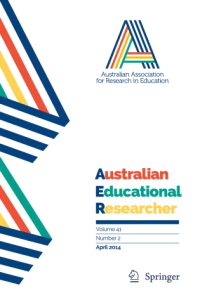
Moving beyond the rhetoric: integrating coding into the English curriculum in Australian primary schools
By Karen Woo & Garry Falloon
Coding and computational thinking are being hailed as the new literacy for the twenty-first century, and have become increasingly common in schools world-wide. At the same time, the sector is facing a global shortage of technology teachers, and technology lessons are frequently being delivered by non-specialist teachers. Therefore, some have suggested integrating coding into other curricula as a practical solution for non-specialist teachers to deliver outcomes in both Digital Technologies and their own subject areas, whilst also developing general capabilities. To better understand the benefits and practicality of integrating coding into the English curriculum, we present a detailed case study of an Australian Year 5/6 classroom where students engaged in learning units integrating both Digital Technologies and English curriculum outcomes. We explored the nature of students’ interdisciplinary learning and general capabilities development through two learning units in which they coded animated narratives (CANs). We also built understanding of how non-specialist teachers in regular classrooms can develop the necessary technological, pedagogical and content knowledge (TPACK) to facilitate cross-curricular learning involving coding, and at the same time, promote general curriculum capabilities. Findings challenge the commonly held assumption that integrating coding can be a universal solution to specialist staff shortages and an overcrowded curriculum, and reveal the challenges faced by non-specialist teachers and school organisations that need to be overcome for successful implementation. However, they also indicate that when these challenges are met, integrated approaches can result in interdisciplinary learning, high levels of student engagement, and provide effective environments for general capability development.

Integrating coding across the curriculum: a scoping review
By Karen Woo & Garry Falloon
Following the popularisation of computational thinking (CT) as a 21st century literacy for all, CT and coding are becoming increasingly common in school curricula around the world. Furthermore, it is estimated that one third of teachers are teaching coding by integrating it into other subjects. However, there is a paucity of empirical research on school-based cross-curricular learning of coding. Moreover, there has been no known work to date to synthesise the research relating to integrated coding curricula in schools. This is surprising given its global prevalence, especially considering countries such as Finland and some states in Australia indicate coding and CT should be integrated into every subject area. This review provides an overview of classroom-based research related to integrating coding across the curriculum, synthesises the evidence of learning that resulted from these empirical studies, and documents school factors that influenced students’ learning in these environments.
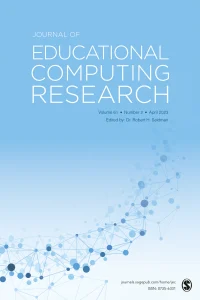
The search for computer science concepts in coding animated narratives: Tensions and opportunities
By Karen Woo & Garry Falloon
Coding is increasingly popular in schools around the world and is often taught by non- specialist teachers as an integrated task with other subject areas. In this article, we explore the relationship between computer science (CS) concepts and students’ multimodal expression in a coding animated narrative (CAN) task in the context of an integrated English-Technology unit of learning. Through this collective case study, we explore how CS concepts underpin semiotic elements of an animated narrative, analyse the factors that influence the extent to which students exercise those concepts, and reveal the tensions and opportunities that a CAN task may present for learning computer science concepts in regular, non-specialist, cross- curricular classrooms. The findings suggest that CAN tasks are unique in presenting opportunities for students to learn challenging CS concepts such as synchronisation and parallelism. At the same time, CAN tasks present tensions for teaching CS concepts in non- specialist classrooms, where student projects are often judged on their visual qualities. In such settings, procedural, rather than conceptual knowledge, may be a more efficient route to creative outcomes. It also means that drawing skills need to be prioritised. Role specialisation often led to better quality projects but at the expense of individual students’ conceptual development in computer science.
Woo, K., Falloon, G. (2023) The search for computer science concepts in coding animated narratives: tensions and opportunities. Journal of Educational Computing Research.
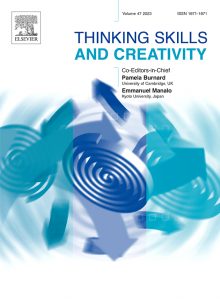
Problem solved, but how? An exploratory study into students’ problem solving processes in creative coding tasks
By Karen Woo & Garry Falloon
Problem solving capabilities have often been reported by teachers as a key benefit from creative coding activities in school-age children. However, few studies to date have defined problem solving, and investigated how it is operationalised in interdisciplinary creative coding tasks. This study aims to build knowledge about students’ use of computational thinking and computer science concepts for problem solving when coding animated narratives. The research investigated students’ coding processes using data gathered from audio and device display recordings and semi-structured interviews. Results suggest limitations to the use of creative coding tasks if the expectation is to develop computational thinking and systematic problem solving strategies, or learn basic computer science concepts. They revealed that novice students rarely solved coding problems using optimal technically-based strategies despite being given explicit instruction on their use, opting instead to bypass problems by adjusting intended outcomes, or by using low level code translation strategies. Results demonstrate that engaging computational thinking or even demonstrating understanding of basic computer science concepts was not a requirement to produce a viable creative coding outcome. This study contributes new understanding of students’ coding practices when engaged in creative coding tasks in regular, non-specialist classrooms. Its findings challenge the commonly-held assumption that coding is a natural ‘vehicle’ to develop computational thinking and systematic approaches to problem solving. It also questions the learning that results from the non-technical, inefficient and often ineffective problem solving practices students employ during ‘creative coding’ tasks, that are frequently used by non-specialist teachers in response to curriculum requirements.
Woo, K., & Falloon, G. (2022). Problem solved, but how? An exploratory study into students’ problem solving processes in creative coding tasks. Thinking Skills and Creativity, 46, 101193.
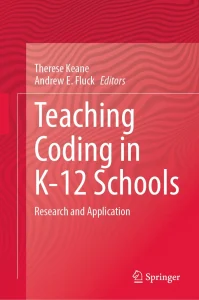
Coding Across the Curriculum: Challenges for non-specialist teachers
By Karen Woo & Garry Falloon
As coding becomes an increasing component of school curricula in many countries, the critical shortage of computer-science teachers means it is often taught by non-specialist teachers through integration with other learning areas. What is not well understood is how these non-specialist teachers balance the goals of their primary discipline with the computing concepts or computational thinking skills they are expected to teach. Finger and Houguet (2009) suggest a range of intrinsic and extrinsic challenges can influence how teachers implement learning programmes and affect intended and received curriculum, that may well be relevant to teaching coding in schools. This chapter draws on data from an Australian Research Council Discovery Project to explore how these challenges influenced the digital technology components of an interdisciplinary unit of learning implemented by non-specialist teachers, within the context of a coding animated narrative (CAN) task. The results highlight the impact of the learning environment on student outcomes.
Woo, K., & Falloon, G. (2023) Coding Across the Curriculum: Challenges for non-specialist teachers. Fluck, A. & Keane, T. (eds.). Teaching coding in K-12 schools: research and application. Singapore: Springer, Springer Nature
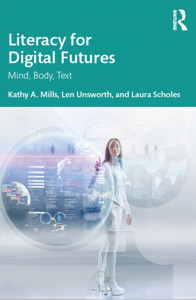
Chapter 9 Advancing Animated Story Composition through Coding in Literacy for Digital Futures: Mind, Body, Text
By Kathy Mills, Len Unsworth, Laura Scholes
While animated movies have long maintained a prominent place in popular culture, today the range of readily available, affordable or free animation software for children has made animation authorship increasingly popular. At the same time advances in digital technology continue to facilitate new approaches to animation creation. Initiatives in teaching computer programming (coding) in primary school have given increased impetus to children’s animation creation and to developing coding as a key dimension of literacy competencies for digital futures. However, while some child coding enthusiasts are creating high-quality animations, including stories of impressive literary quality, pedagogic research for coding animated narratives has largely occurred outside of regular classrooms and while participants have been effectively initiated into coding, the stories created do not reflect the knowledge of narrative technique or authoring competencies as indicated in English Language Arts (ELA) curricula. In this chapter we probe these disparities and suggest a re-focussing of the programming as writing movement, involving a rebalancing of coding and multimodal authoring to align with common international ELA curricular expectations, and a re-configuring of research and pedagogy development to reflect the intersection of coding and multimodal authoring as a basis for further advancing coding animated stories for all students.
Conferences and Keynotes

Coding Animated Narratives and Digital Interactive Literature
Unsworth, L. (2022) Coding Animated Narratives and Digital Interactive Literature: Creative 21st Century Curricula for English and Literature Education. Invited plenary presentation, the 39th International Conference on English Teaching and Learning (ETRA 2022), Fu Jen Catholic University, Taipei, Taiwan, July 15-16, 2022.
